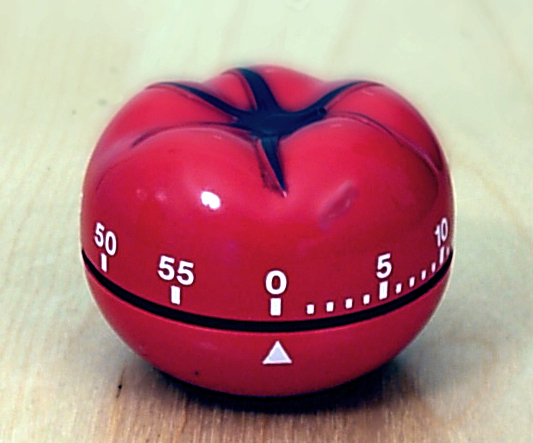Haseung Jun
Productivity ⏰
44 resourcesSee Units
How to Use the 6 Steps of the Pomodoro Method
Ah, studying: the pastime of a student in their free time. What a seemingly terrible thing to do, even though you need to do it all the time! 😩
Here's the huge BUT: even if studying is infinite degrees beyond boring, there's a way to maximize your productivity in a short amount of time so you can have more time to do fun stuff. ⏰
And, let me introduce you to my good old friend: the POMODORO TECHNIQUE! 🏆
What is the Pomodoro Technique? 😵
So here are the steps to Pomodoro success!
- Create a task list. 📋
- Study intensely (without any distractions) for 25 or 50 minutes. 👀
- Take a 5 or 10 minute break. 🍦
- Repeat the Pomodoro cycle for 4 or 2 times! 🚴
- Take a longer 15 to 30 minute break. 💤
- Repeat Pomodoro again! 🛵
How It All Began 📅
Back in the 1980s, a college student named Francesco Cirillo tried to get through his busy life as a college student, only to find that he couldn’t entirely concentrate. 📚 How did he get through college, then? 😱
Well, good old Francesco decided to concentrate for only 10 minutes and then take breaks. He used a kitchen timer to keep track of these 10 minutes. The timer itself had a similar shape to tomatoes, which the name "pomodoro" (Italian word for tomato) originated from! 🍅

Image courtesy of Wikipedia
Suddenly, Francesco’s concentration skills skyrocketed. He found himself finishing his assignments quickly, and because he was a kind soul, he wrote a 130-page book (The Pomodoro Technique) about it so everyone could get inspired and apply his own techniques to their own study spaces! 👌
Rules 📜
Just because the Pomodoro Technique is an excellent study technique doesn't mean that there aren't rules to make it super successful! Here are some rules that you should always follow no matter what. 😉
- Break your complex tasks into tiny ones, so you can feel accomplished by crossing them off. Try breaking it up to each page instead of saying "do Spanish homework (workbook pages 119-134)"! 🧩
- Combine simple tasks. If you have many simple, manageable tasks that won't take the whole session, make sure to combine those, so you don't have anything to do after 10 minutes of your session! 😍
- No distractions. Repeat: NO DISTRACTIONS!! When you're doing your intense studying, don't get distracted by checking your email or texts. If you really feel the urge to do that, do it during your break time or make it a task. Getting distracted and not getting the full 50 minutes pumped up kind of defeats the whole purpose of the Pomodoro Technique, so try to stay away from your phone! 📱
Why It Works ⚙️
Your brain can't operate 24/7 of intense concentration: we're human, and sometimes you need to tell yourself you can't pull an all-nighter. ⏰
How about concentrating for only 25 or 50 minutes? That's pretty doable for everyone! Your brain also needs some time to take the knowledge and solidify it in your brain, which is why break times are super important. ✔️
Dr. Barbara Oakley also explains how the Pomodoro Technique is helpful in terms of your brain's mechanisms. The technique also works because it makes things easy to start. Have you ever seen yourself not getting on something because it seemed like too much? By breaking it into small tasks, you already combatted this fear to start! 😨

Image courtesy of Wikipedia
Also, it helps with combating distractions. By promising yourself not to get distracted, you essentially get rid of the phone factor that's been blocking you from your success! Once you're done with your homework, thanks to Mr. Pomodoro Tomato, you'll have much more free time on your phone, which is a plus! ➕
Lastly, you can keep track of where your time goes. Sometimes, we underestimate the amount of time needed to do something (even though we know how long it’ll actually take), leading to procrastination. You’ve probably found yourself thinking that you’ll be able to write your whole English essay in 2 hours even though you know it’ll take much longer than that, and it ends up with you pulling an all-nighter. With the Pomodoro Technique, you’ll know that an English essay takes more than 6 hours, which will help you plan out your study plan. 📝
Browse Study Guides By Unit

Fiveable
Resources
© 2025 Fiveable Inc. All rights reserved.